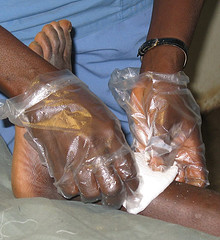
 “I have an incision from breast cancer surgery that will not heal,” says forum-contributor ysqueen. “It’s been over 4 weeks. My Dr. says to just give it time, but it is getting bigger not smaller.”
“I have an incision from breast cancer surgery that will not heal,” says forum-contributor ysqueen. “It’s been over 4 weeks. My Dr. says to just give it time, but it is getting bigger not smaller.”
“My sis-in-law had the surgery,” says caregiver Anna, “and she will begin chemo but her deep wound won’t heal….”
Chemotherapy, radiation, and lack of nutrition during cancer can cause delayed wound healing, where typical cuts, scrapes, scratches, and punctures-and particularly surgical incisions-take much longer than normal to repair themselves.
According to Wyatt G. Payne et al., of the Institute for Tissue Regeneration, Repair, and Rehabilitation at the Bay Pines VA Medical Center in Bay Pines, Florida, “Many factors impede the ability of patients with cancer to heal: the disease process itself, the timing and invasiveness of the treatments…, and host factors including mental outlook, nutritional status, and social situation….”
Researchers go on to explain that radiation, because it damages healthy tissues as well as cancer cells, complicates wound healing. Chemotherapy-because it targets rapidly dividing cells-interferes with wound healing as well, since immune cells involved in tissue repair also divide rapidly. Finally, 40-80% of cancer patients are clinically malnourished, which makes them increasingly susceptible to infections and delayed healing.
What can you do? Researchers recommend delaying radiation treatment for a minimum of 3 weeks after surgery to give surgical wounds time to heal, so if you’re scheduled for radiation, you may want to talk to your doctor about the healing of any surgical incisions. Since chemotherapy drugs create so many varying effects on different individuals and at different dosages, it’s more difficult to give a blanket recommendation. Timing, dosage, and type of drug used can all make a difference, so it’s best to monitor yourself carefully as you go and report any difficulties to your physician.
There is one area where you can take more responsibility for your own health-nutrition. Payne references a study by Ondrey FG et al. and says, “The relationship between optimal wound healing and positive nutritional balance is well documented.” Though it’s best to see the help of a naturopath or dietician to target your particular nutritional needs as you’re going through treatment, below are a few general recommendations:
- Make sure you’re getting adequate calories and protein
- Vitamins C and A optimize healing and recovery (studies show a 50% reduction in tensile strength of healing wounds in patients suffering from vitamin C depletion)
- Vitamin E has been shown in several studies to support wound healing, though exactly how it does so is still in question
- Zinc deficiency impairs protein production-restoring zinc to healthy levels returns wound healing to a healthy rate (take extra zinc only if you are deficient-excess zinc can be detrimental)
If you do have a wound that is stubbornly not responding, get help. “A simple wound can move down to the bone and cause a bone infection,” says Dr. Gerald Mouton with Lake Charles Memorial Hospital. “It can spread up and down muscle tendons and the larger the wound gets…the more difficult it is to heal.”
Other tips for wound care include:
- wash your hands thoroughly before and after changing dressings,
- remove dressings carefully (to avoid reopening the wound),
- clean wounds daily (don’t rub),
- always use new dressings and bandages,
- don’t pick at scabs,
- and eat vitamin-rich foods like citrus fruits, leafy vegetables, whole grains, lean meats, fish, and eggs.
Have you had an experience with a stubborn wound? Please share with us.
1 Ondrey FG, Hom DB. Effects of nutrition on wound healing. Otolaryngol Head Neck Surg. 1994;110(6):557–9.
Photo courtesy of MikeBlyth via Flickr.com.

